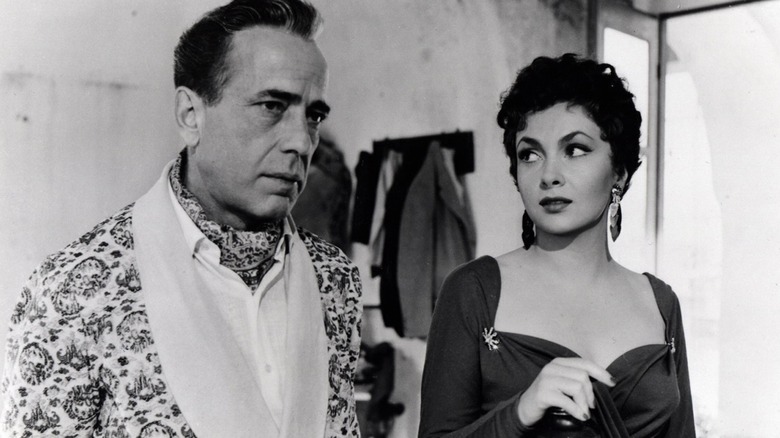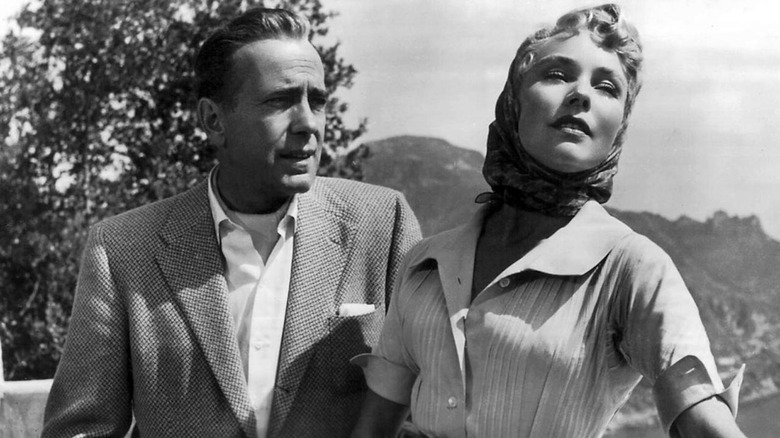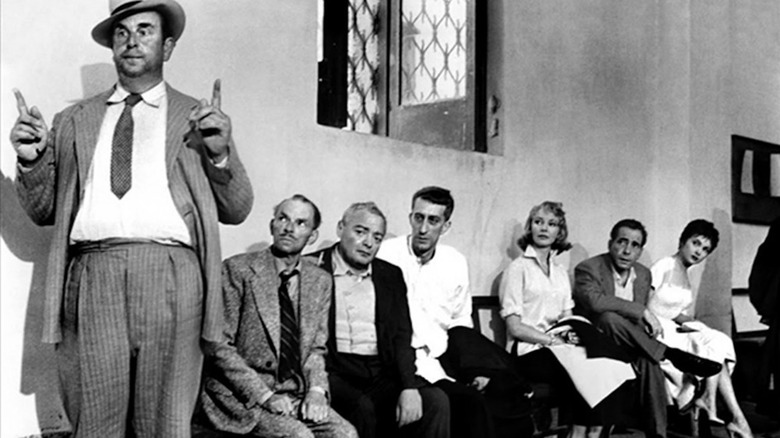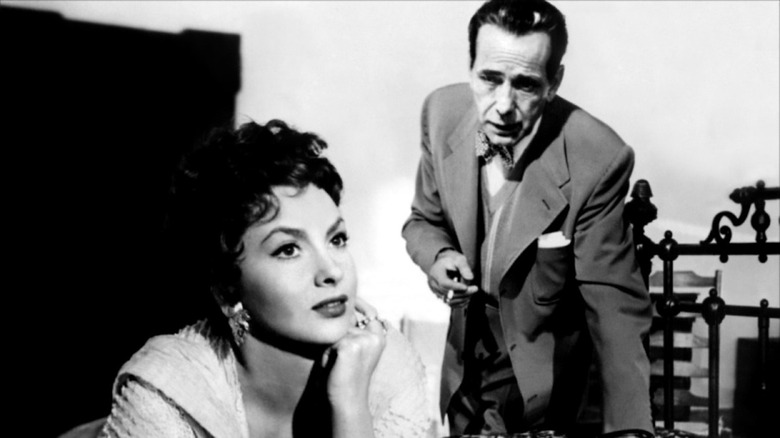The Movie That Ended Humphrey Bogart's Creative Relationship With Director John Huston
We may receive a commission on purchases made from links.
In the pantheon of great director-actor pairings, it is hard to match the six-film run of John Huston and Humphrey Bogart. The blustery filmmaker and his brutally handsome star confidently segued from the world-weary noir of "The Maltese Falcon" to the caustically funny misadventure of "The Treasure of the Sierra Madre" and on to the rambunctiously romantic banter of "The African Queen." Over their first five films, Huston's style is refreshingly unfussy. He's not trying to knock the viewer out with bravura coups de cinema. Rather, he reads the emotion of his characters, and, if he's cast well, the camera always ends up in the right place, while every cut and transition flows mellifluously through to the final reel.
Huston made a lot of movies, and more than his share of stinkers, but he never misfired when collaborating with Bogie — that is, until 1953, when they came together for the garishly cynical "Beat the Devil." Based on a novel by British journalist Claud Cockburn (writing under the pseudonym James Helvick due to a prior association with the Communist Party), the oddball caper comedy stars Bogie as a hard-up schemer keen to make a crooked killing via the acquisition of Kenyan uranium mines. This might sound like a classic Huston-Bogart joint on paper, but the finished film is a startling mélange of incompatible styles. Critic Dave Kehr called it "the birthplace of camp," and given Huston's wacky, unmotivated deployment of odd angles and discomfiting lenses, it certainly feels like the uber-macho filmmaker is engaging in some form of self-parody.
Alas, Huston declined to cut his star in on the joke, which marked the end of a beautiful creative partnership.
A luxury Huston could not afford
According to Stefan Kanfer's "Tough Without a Gun: The Extraordinary Life and Afterlife of Humphrey Bogart," the production of "Beat the Devil" was born in bad faith. Having enjoyed Cockburn's book, Huston took it upon himself to purchase the rights for $10,000, money he did not have. His movie star buddy had it, however, and he fronted the cash. "I have tremendous respect for your opinions, drunk or sober," said Bogart.
The trouble started with the screenplay. Cockburn knocked out an "unusable" script, forcing Huston to pivot to seasoned writers Peter Viertel (who'd survived Huston's macho antics during the making of "The African Queen") and Anthony Veiller (a prolific scribe best known for his 1946 adaptation of Ernest Hemingway's "The Killers"). When these former collaborators couldn't deliver, Huston took the advice of David O. Selznick and hired the up-and-coming Truman Capote, who was uniquely talented and fearless in the presence of Hollywood royalty, which tickled Huston. During the shoot, Capote bested Bogart in both arm wrestling and full-on grappling. When the latter contest left Bogart with a shoot-delaying hairline fracture to the elbow, the star took it in stride, going so far as to profess admiration for the openly gay writer in a letter to his wife, Lauren Bacall:
"Wait till you meet our screenwriter. You have never seen anything like him. At first, I didn't think he was real — but he grows on you, and now I'd like to carry him around in my pocket, and take him out whenever I need a laugh."
Or, you know, whenever he needs a proper thrashing. In any event, by the time "Beat the Devil" entered post-production, Bogart would need all the laughs he could get.
Bogie cleans up Huston's mess
Due to his financial investment, Bogart had more control over the final cut than Huston, and he was alarmed to find what wasn't working during the shoot — where Capote was delivering new script pages almost every day – really didn't work in the edit. The va-va-voom Gina Lollabridga and director-reliant Jennifer Jones seemed distressingly out of place. As for Bogart, he looked like a man who knew he'd been taken for a ride. Whatever Huston and Capote had been up to, Bogie wasn't with it.
Most insultingly, he discovered some of his dialogue had been dubbed by a Bogart sound-a-like. To be fair to Huston, this had been necessitated by a car wreck early in the shoot which left the star adjusting to new dental bridgework. Still, the star was stung that Huston neglected to inform him of this. Had Bogart lived to see the 1960s, he might've found some warmth for his imitator, a young British comedian named Peter Sellers.
Flummoxed by Huston's assemblage, Bogart turned to editors Gene and Marjorie Fowler, who reconstructed the film to emphasize its arch nature early on. It didn't work. Though some critics found "Beat the Devil" charming in its shaggy-dog manner, audiences were appalled. The film was a flop. Kanfer writes that a Baltimore theater owner who offered ticket buyers a full refund if they didn't enjoy the movie wound up shelling out quite a bit of cash during its run. Among the film's detractors was Bogart, who said, "Only phonies think it's funny. It's a mess."
Two legends part ways
Bogart and Huston remained friends, but the star steered clear of his frequent collaborator for what would wind up being the last seven films of his career. There might've been a creative rapprochement had Bogie not died of esophageal cancer in 1957, though it's just as likely Huston would've struggled through the '60s even with his buddy around. Bogart rebounded the following year with "The Caine Mutiny," for which he received his third and final Academy Award nomination for Best Actor. Huston briefly bounced back with his ravishing Technicolor adaptation of "Moby Dick," but soon found himself in an artistic slump from which he only periodically recovered.
"Beat the Devil" eventually found high-profile champions in the likes of Roger Ebert and Susan Sontag, but it's still an acquired taste. Capote's screenplay is riddled with witticisms, which are delivered with relish by ace character actors Peter Lorre and Robert Morley. It doesn't work at all as a caper, but the audacity of the film is occasionally intoxicating. Take it on its own, blithely untidy terms, and you might have a ball. You just have to make peace with the fact that Bogie would've considered you a phony.



